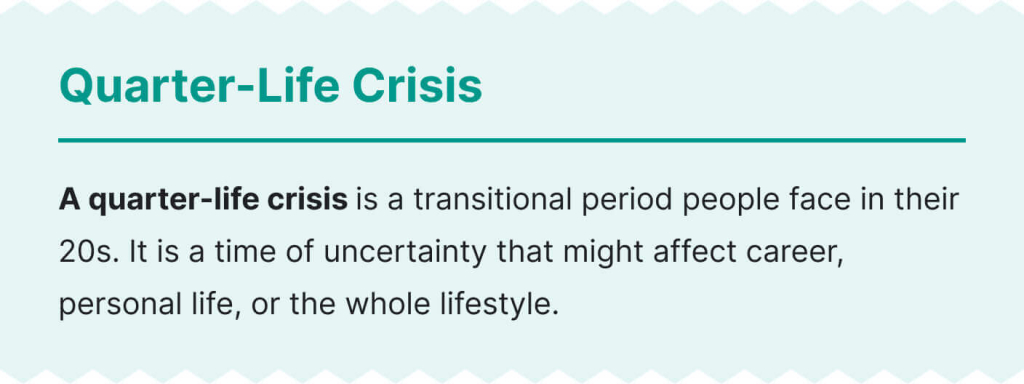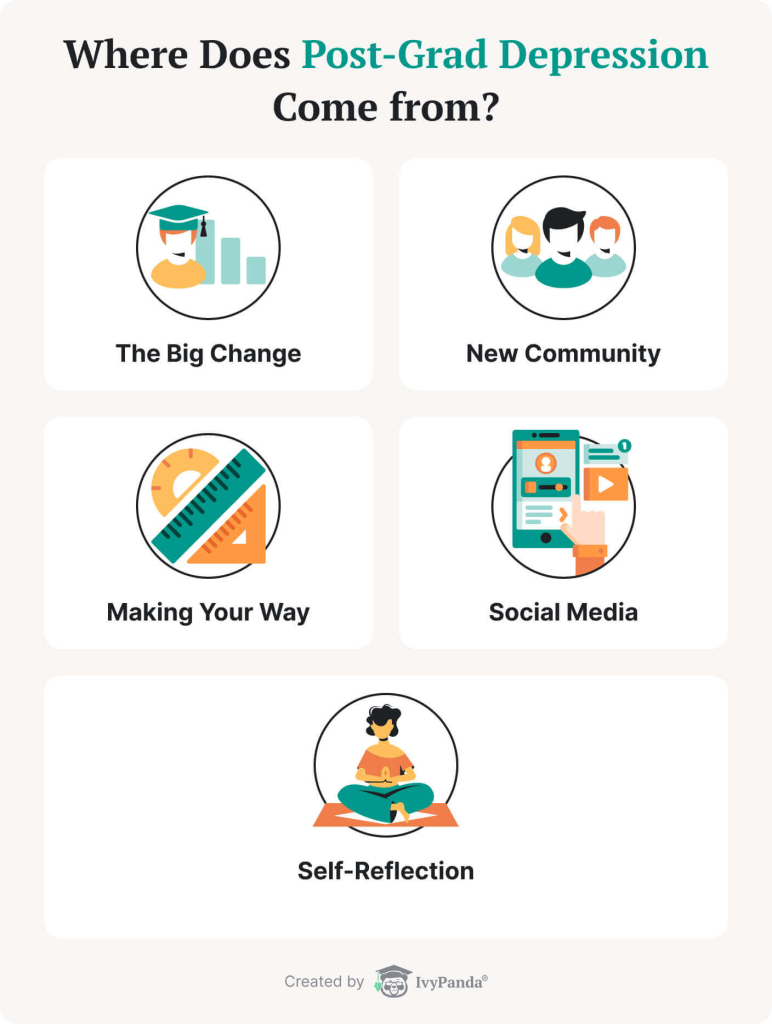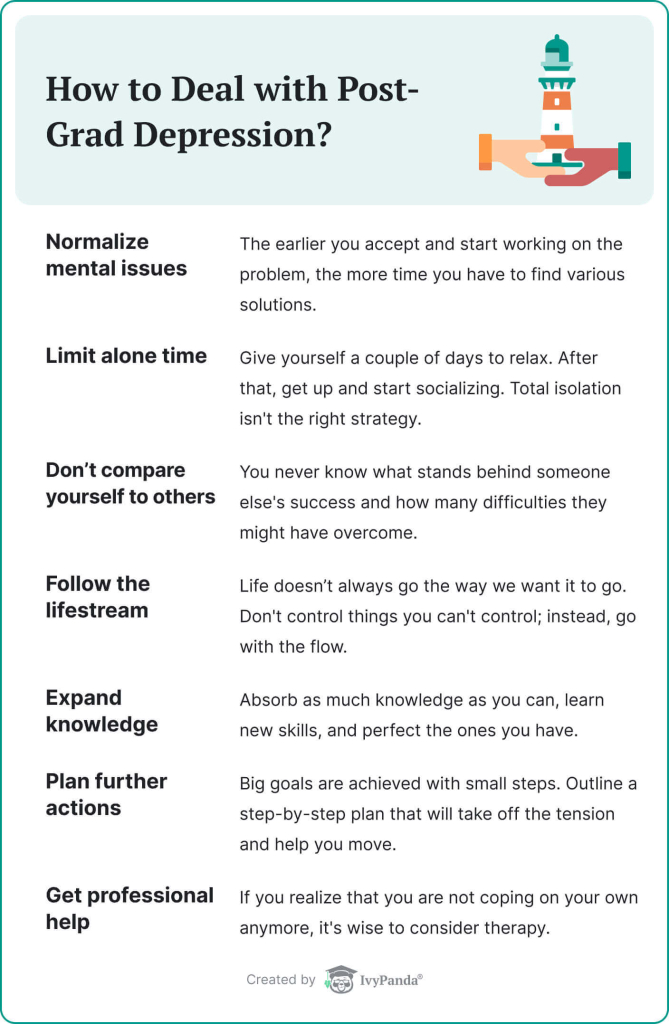This article speaks about the mental struggle students can experience after graduating. Post-graduation depression is something that can affect graduates with different life experiences all over the world. Being so widespread, it is impossible to find a universal solution that will fit everyone. However, we have formulated key recommendations that should resonate with many.
First, a disclaimer: we refer to this struggle as depression. We use this terminology to describe a person’s experience characterized by decreased motivation, feelings, mood, and overall well-being.
After reading this article, we recommend searching our essay database for related topics. We have a wide variety of research papers on health and well-being, all 100% free!
🌗 Quarter-Life Crisis – a Period of Uncertainty

To better understand the roots of post-grad depression, we first need to discuss a quarter-life crisis.
Have you heard of it?
A quarter-life crisis may appear when a person is between the ages of 20 and 30 and finds themselves at a loss as to life’s purpose. This might occur in career, personal life, and lifestyle in general. For example, you may have no idea what to do after graduation, or it may turn out that your job does not bring you fulfillment. The reasons for such concerns may vary.
The concepts of a quarter-life crisis and post-grad depression often go hand in hand. This is because they both raise uncertainty and anxiety about the future. Significant pressure can also come from believing that your 20s are all fun and games without difficulties.
💔 Where Does Post-Grad Depression Come from?
Reasons for post-graduation depression are all very personal, but you may recognize some of those outlined below.

The Big Change
Let’s admit that any change, positive or negative, can be stressful for our mind and body. Getting used to new situations can often be overwhelming.
After graduation, responsibilities can add up, including earning money, taking care of yourself, and paying bills. And it’s only a tiny part.
This can also be an incredibly tense time for those with overly enthusiastic parents who do everything for their children. For people who have had the experience of combining study with other responsibilities, it might be a bit easier.
New Community
The people around us matter a lot. Over time your social environment changes – you won’t see familiar faces every day and will need to get used to new ones. Some people go through such changes quickly, and others struggle to build new friendship circles. Our social abilities can vary wildly.
For example, getting along with your new work community might be challenging. People outside your university or college are more diverse, and you won’t always understand them. It’s vital to know how to handle this diversity and make benefits of networking.
Making Your Way
We are all so different! Each of us has our own story.
It may sound simple, but some people get their dream job right after graduation, while others have a longer journey. One can be searching for the right place for months and even years. More important is to find something that will light you up and drive you.
However, even if your job search is successful, you might have doubts such as, “Is this THE job? Am I capable of more than this?”
Active Social Media Use
The world today is hectic and fast-changing. In the chase for love, job, success, we notice others more than ourselves.
You’ve probably heard about the correlation between social media and mental health issues. Seeing other people’s achievements on Instagram daily, we may get frustrated instead of motivated. It happens because we know the result, not how one has got there.
Reflecting on Life
As one period comes to an end, we start asking questions such as, “So what?” “How have I changed?” “What do I want now?”
The last time we checked, humanity still struggled with existential anxiety, which is a truly human condition. Our consciousness always makes us seek the meaning of existence and life. Such a philosophical question may bother you until a satisfying answer is found. And that is not a fast or easy process.
👀 Symptoms of Post-Grad Depression
The section below is dedicated to the possible signs of post-grad depression. However, always remember that there’s no one particular pattern. The symptoms may vary and show up differently, which is all quite normal.
- Feeling of disconnection and emptiness when your studies are over. You realize it’s time to say goodbye to uni, but you still feel attached to this period and people.
- The urge to fill this gap in your heart with something else. You may want to use different means to overcome sadness.
- Feeling of apathy: you can’t make yourself get back into your usual routine. Instead, you might be staying in bed reflecting on your future, job, or whatever.
- Pessimistic vision: the images of the future in your head are gloomy and vague. Thinking about what comes next makes you anxious and uncertain.
- Increased sensitivity: you might experience breakdowns and tears more often than usual. This experience is most commonly linked to post-grad depression.
What gets you down? How has your behavior changed since graduation?
🔧 How to Deal with Post-Grad Depression – a Manual for Graduates
Understanding the roots and symptoms of post-graduation depression is the first and crucial step in the process. Now, we can get to the most exciting part – what to do to get rid of post-grad depression?

1️⃣ Normalize Post-Grad Depression
The best decision at the start is to admit that you are experiencing difficulties. Instead of denying it, embrace it – there’s nothing to be ashamed of! The earlier you accept and start working on the problem, the more time you have to find various solutions.
Realizing that your feelings are justified and normal will improve the process of recovery. Be assured that there are numerous ways to get out of this. However, nothing will work if you don’t accept your feelings.
2️⃣ Limit the Time You Spend Alone
You might think that if you are on your own, a great decision will come faster. Nevertheless, total isolation isn’t the right strategy, and here is why:
It will be challenging to resume socialization.
Staying alone with your depression for a long time might drag you deeper into it.
So, if you feel the need to take a break from social life, do it. But don’t let it last for too long. Give yourself two or three days to stay in bed and chill. After that, get up, dress up and meet someone in a place you like. It’s vital to communicate, share your feelings, and listen to different opinions. Interaction with positive people can give you valuable insights into your situation.
3️⃣ Don’t Compare Yourself to Others
This step is one of the most challenging!
We all tend to compare ourselves and our achievements to others. Not just after graduation but throughout our whole life. However, everyone has their own path. You never know what is behind someone else’s success or how many difficulties they may have overcome.
Instead of spending your time and resources comparing yourself to others, apply that energy to something more fulfilling. And you’ll see the results.
4️⃣ Follow Life – It Doesn’t Always Go as Planned
Another precious piece of advice you could use is to trust the process. Remember that things don’t always go the way we want or imagine. Don’t try to control things you can’t control, relax a bit and go with the flow. When your body and mind are relaxed, decisions come more easily. Moreover, life itself will start to give you hints and prompts.
Here is one great thing about the modern world: there are way more opportunities than there used to be. You just need to start noticing them. Ask yourself: “What drives me and makes me want to progress?”
5️⃣ Expand Your Knowledge & Skills
You can also help yourself considerably if you start learning new things. Look at the world from the perspective of a child. What else do you need to know to become more competent and assertive?
Another good idea is to consider expanding the skills you already have. This will raise your profile in the job market. It will also boost your self-esteem and gratitude.
6️⃣ Outline a Plan for Further Actions
We suggest you map out an approximate outline for navigating your near future. Remember: big goals are achieved with small steps. This simple strategy will take off the tension and help you move.
What are the possible routes to follow? Think of them and choose the most appealing ones.
7️⃣ Turn to Professional Help
There are moments in life when we feel overwhelmed. When you realize that you are not coping on your own, it’s wise to consider therapy.
A good psychologist is an excellent solution, but not because you’ll get all the answers. Therapy aims to help you better understand yourself, your motives, and the world around you. In other words, professional assistance can help you figure out what’s keeping you from acting.
Seeking the support of a therapist is not something to be ashamed of. If you feel the need for it, don’t hesitate.
🏁 Summary
Post-grad depression is a widespread problem among young people in their 20s. It can be tough but not unbeatable. The critical measure you need to take is accepting and respecting your emotional condition. Remember that you are enough, just as you are. Every time you feel down, try to focus on everything you’ve already achieved and the hardships you’ve already overcome.
Be kind to yourself, you have a bright future!



